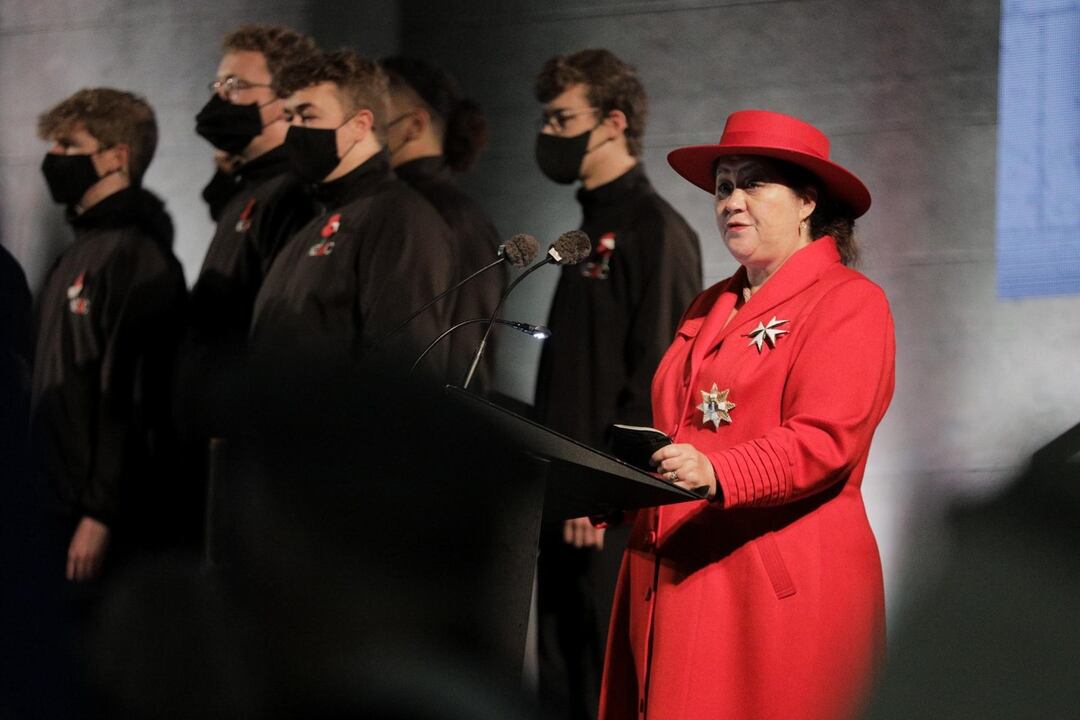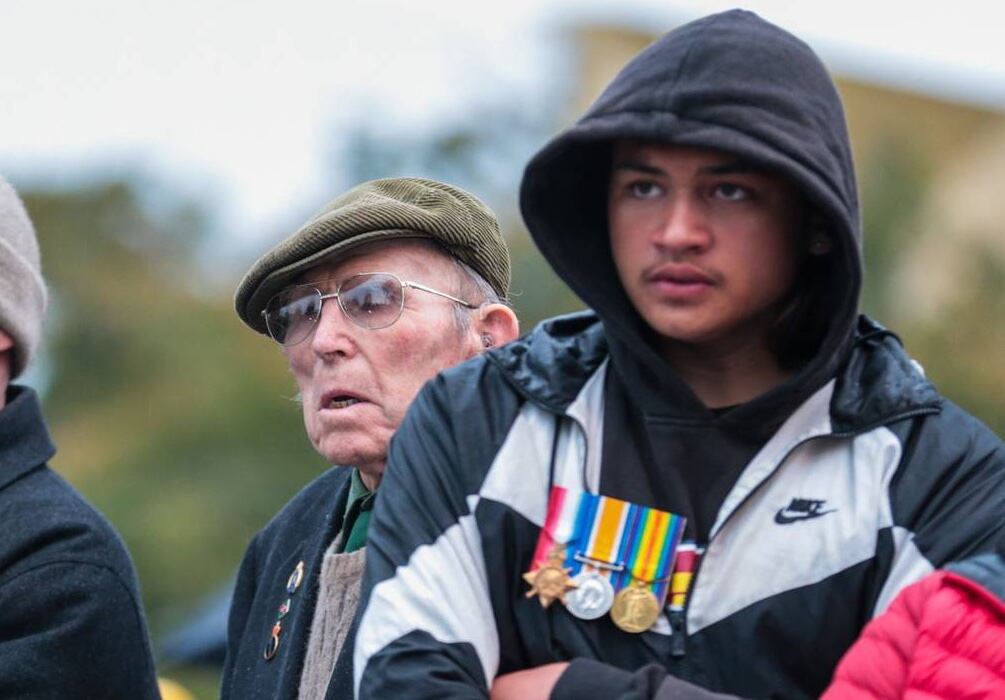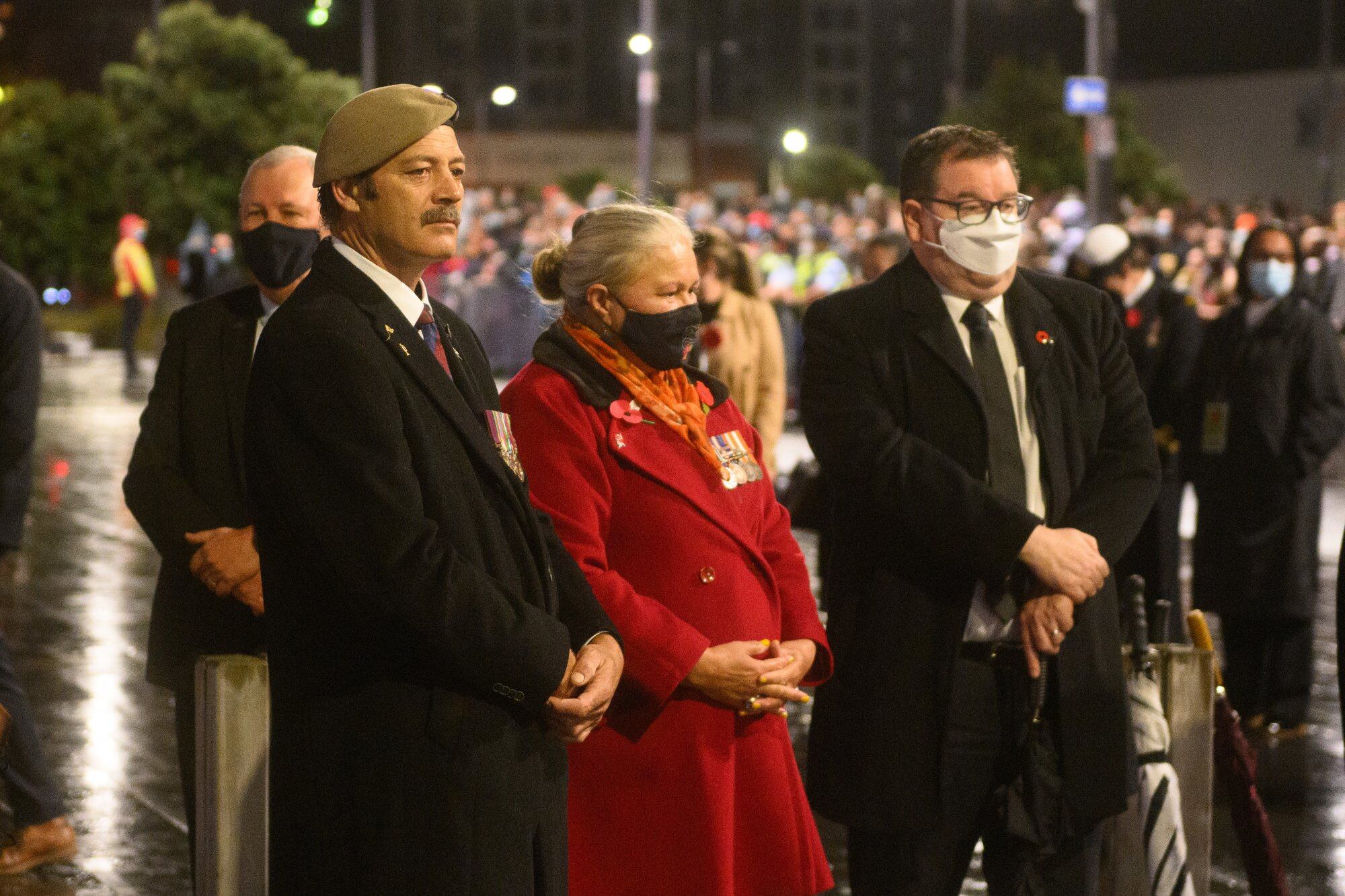Above: Māori Television's live coverage of ANZAC Day 2022
Thousands have gathered across Aotearoa to commemorate ANZAC day with the Governor-General Dame Cindy Kiro (Ngā Puhi, Ngāti Kahu, Ngāti Hine) paying tribute to the more than 250,000 New Zealanders who have served overseas, and highlighting concerns about Russia’s invasion of Ukraine.
"Every New Zealander who has served our country in war or conflict deserves our greatest respect – this day and every day. Let us honour our brave service personnel, and all who have lost their lives in service to New Zealand." Kiro said, addressing crowds at the Pukeahu National War Memorial Park cenotaph in Pōneke.
In her inaugural speech leading ANZAC commemorations since taking on the Governor-General role in October, Kiro paid tribute to the 50 Defence Force personnel deployed earlier this month to support roles in the Ukraine conflict and other troops serving across the globe.
"Today, we acknowledge members of the New Zealand Defence Force who are deployed overseas, often working in dangerous and complex situations requiring the utmost sensitivity, skill, and care.”
"I am proud to have as part of my title, Commander-in-Chief.” Kiro added.

Governor-General Dame Cindy Kiro (Ngā Puhi, Ngāti Kahu, Ngāti Hine) at the Pukeahu National War Memorial Park cenotaph in Pōneke paying tribute to the more than 250,000 New Zealanders who have served overseas.
Ukraine flags were flown on the War Memorial Museum in Tāmaki Makaurau and at the cenotaph in Wellington at the request of the Returned Services Association (RSA).
"We feel deeply for those suffering in current conflicts. For them, the simple joys of normal life – home and family, work and friends – have been replaced by the daily struggle to keep themselves and loved ones safe. Their new reality is one of trauma, grief, and displacement. Kiro said.
"Anzac Day in 2022 finds us weary from the stress of the ongoing COVID-19 pandemic, and witness to disturbing new discord across the world.”
Kiro called on all New Zealanders to support each other and those affected by the displacement and disruption of conflict.
"While there is much that we, as individuals, are powerless to change, as the light of a new day spreads over Pukeahu and Aotearoa, we can resolve to continue to be there for each other, and for all who are affected by war and conflict – past and present."

Prime Minister Jacinda Ardern laying a wreath at the cenotaph at Auckland's War Memorial Museum in Tāmaki Makaurau / NZME
In Tāmaki Makaurau Prime Minister Jacinda Ardern led processions where around 2000 attended; anthems of Aotearoa and Australia were sung in Te Reo Māori and English, as New Zealand and Australian flags were raised.
Speaking later at the War Memorial cenotaph in Mt Albert Ardern honoured the ‘courage, compassion and spirit of service’ of the world war veterans.
"Anzac Day is a time to give thanks to today's armed forces who strive to uphold the values we hold dear as they continue to serve in areas of conflict overseas.” She said.
"And it is a time to acknowledge all who have been affected by war – those who have lost loved ones, those who have shared the struggles of family members returning from service, and those who have come to us as refugees."
Ardern said the invasion of Ukraine was a ‘grim reminder’ of the fragile nature of peace, calling Russia’s invasion a ‘senseless act’.
"In New Zealand we may feel a great distance from this conflict, but we are all inextricably linked to what it represents."

Young and old gather at the Hastings Civic Square Cenotaph for ANZAC day services. Photo / NZME
Overseas Minister for Veterans Meka Whaitiri attended the first of her official engagements in Turkey commemorating the Battle of Gallipoli and ANZAC Day.
"It's absolutely special after two years' absence to return back to a significant site like Gallipoli to remember those that fought here over 107 years ago, the relationships that were formed between the NZ soldiers and obviously the Australian soldiers. But also the relationship that's been forged through our shared history with the Turkish people and the Turkish government, " Whaitiri told Te Ao Māori News on Saturday (NZ time).
Whaitiri said it is particularly special as a Māori to be at Gallipoli to remember those who have fallen and acknowledge the Turkish people who have cared for "our sons that are buried in this whenua".
"To be here, after two years' absence, as the Minister of Veterans and also a Māori MP is particularly important to me," said Whaitiri, who was at Mehmetcik Abide Peace Park in the Gallipoli Peninsula.
"The Turkish people's generosity in allowing us to come here and acknowledge the contribution of our Anzacs and the way in which we do that is also very special."

Whānau gather for the dawn service at the Pukeahu National War Memorial Park cenotaph in Pōneke. / DIA
Whaitiri shared her own personal connection to Anzac Day commemorations.
"I come from a long line of soldiers that served in the NZ Army. My dad served in Korea, his half-brother and his uncle were members of the 28 Māori Battalion. Both killed in action in Italy and they were part of C Company. And then I've got tīpuna that go back further, particularly Mita Pohatu and Turoa Pohatu both from Muriwai, Manutuke where I'm from who also served in the First World War."
Whaitiri said there is always a place for Māori culture in these commemorations and that it is important the stories of Māori soldiers who served in Gallipoli are also told.
"Kaupapa Māori in terms of Anzac commeration has always been a part of our commerations here in Gallipoli. I hope to see that continue," Whaitiri said.
"It's important to also tell our stories of those who served in the Māori Pioneer Battalion as well as the 28 Māori Battalion.
"I think in the Second World War there's an appreciation of the role the 28 Māori Battalion fought in service, but stories are only starting to come out of the Māori Pioneer Battalion - and adding the rich tapestry of their contribution in the First World War and particularly here in Gallipoli."

Sir Jerry Matepaere salutes the troops and those defence men and women who made the ultimate sacrifice for New Zealand. Photo / NZME
Meanwhile, in the UK, Prince Charles also paid tribute to the ANZAC contribution to the war effort.
"On this ANZAC Day, my wife and I are thinking of all the courageous troops who endured so much in 1915 on the beaches and in the rugged hills of the Gallipoli Peninsula," Charles said in a statement.
"In 1916, one year after the Gallipoli landings, my great-grandfather, King George V, wrote of the first Anzacs, 'They gave their lives for a supreme cause in gallant comradeship'.
"One hundred and six years later, gallant comradeship remains a defining mark of the uniformed men and women of Aotearoa, New Zealand and Australia.”
Charles raised his own concerns about the developing conflict in Ukraine as the death toll spirals into the thousands, towns and cities are levelled and millions are displaced.
"As we pause to reflect on the sacrifice of the Armed Services personnel of Australia and New Zealand in two World Wars, and in other conflicts and peacekeeping operations, our thoughts will also be with those communities around the world who are being torn apart by violence and conflict, and those who are fighting for freedom in the face of oppression," the Prince said.
Charles concluded his statement “Lest we forget”.

